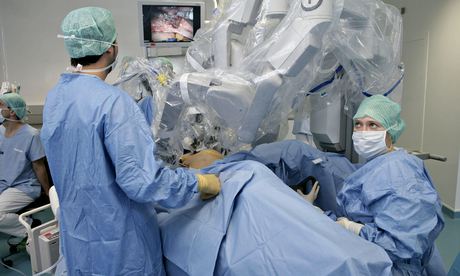
New life-saving surgical techniques are not being adopted quickly enough in British hospitals. That is the stark conclusion of a report by the Royal College of Surgeons (RCS) which warns this week that patients are missing out on new procedures because the NHS is failing to set up programmes to promote their use in the UK.
The report, Innovation to Adoption: Successfully Spreading Surgical Innovation, stresses the need to find ways to introduce new surgical techniques as quickly as possible, thus saving lives and helping the NHS to save money.
New surgical techniques – involving robotics, 3D-imaging and lasers – have been developed in recent years, but in many cases have only been introduced in a haphazard manner in British hospitals. This failure to act coherently is now causing concern among surgeons.
"Many patients are not benefiting from ground-breaking procedures, even when surgeons firmly believe that they can save or extend lives. This cannot continue," said Professor Norman Williams, the RCS president. "We cannot afford to neglect the kind of surgical innovation that has made such a difference to survival and recovery, such as keyhole surgery and advancements in transplant surgery." He added that the NHS, the government and doctors had to understand how to accelerate innovative surgical practices in the UK.
The point was backed by David Neal, professor of surgical oncology at Cambridge University. "The NHS is the perfect place to test new technologies," he said. "It covers the whole country and gives us an ideal platform for showing the worth of a new surgical technique. Unfortunately, this is not being done. The NHS does not seem to be able to tackle this sort of thing. Instead, we are relying, in many cases, on tests being done in the US, where there are commercial pressures involved."
Neal has been involved in using a semi-automated technique known as robot-assisted radical prostatectomy (Rarp) to treat prostate cancer in the UK. "The technique greatly improves a human surgeon's performance," said Neal. "Using current methods, a patient is typically in hospital for around five days, while around 20% of them need blood transfusions. With Rarp, they can leave the next day and only about 1% of patients need a transfusion."
About 200 prostate cancer patients are now being treated every year using the new technique. "That is far to low a figure," Neal added. "We need to introduce the technique to enough hospitals to treat around 10,000 patients a year, but that is not happening." He added that the UK needed a network of about 10-15 hospitals where new medical techniques would be taught to surgeons.
The need to promote robots in medicine is seen as being particularly important in future. The first robot procedure was offered to NHS patients in 2004, but the NHS has yet to fund the purchase of a single surgical robot and has relied instead on charities and endowments to provide cash to buy them.
A programme to help surgeons learn keyhole colorectal surgery for patients with bowel cancer and other conditions was set up in 2007. Mark Coleman, a consultant at Plymouth Hospital involved in creating the programme, said: "In 2008, 10% of operations on the colon involved keyhole surgery. Now that figure has reached 50% and the saving for the NHS over that period has been calculated as being around £11m."

